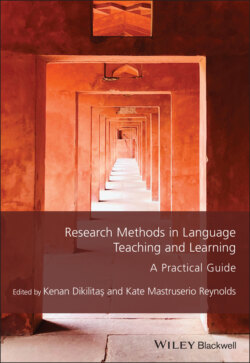Читать книгу Research Methods in Language Teaching and Learning - Группа авторов - Страница 59
Conclusions
ОглавлениеThis chapter addressed a number of significant issues that need to be taken into account when designing a study that attempts to improve classroom practice. The research described shows that it was possible to implement student negotiation in an EFL speaking class. Following an action research methodology enabled several interventions and collecting systematic data on the effectiveness of these interventions. These led to improvement in the research interventions, and hence, classroom practice. Investigating an under-researched area (i.e., student-negotiated EFL speaking class) necessitated building theory from the data. Therefore, grounded theory was used to design the research procedure, which led the researcher to a theoretical understanding of the influence of student-negotiation on a variety of factors that are likely to improve learners’ EFL speaking competence.
Although the findings revealed several positive outcomes related to the role of student negotiation in EFL speaking classes, the study did not test whether it contributed to students’ speaking competence. A focus on this issue would make the research more productive in terms of exploring the benefits of student-negotiated speaking classes. This requires collecting data for a longer period of time, because it is difficult to improve learners’ speaking competence in a limited period. It would also be useful to follow experimental methodology to test whether there was a causal relationship between student-negotiation and EFL speaking competence.
This study served one of the significant objectives of educational research, which is improving classroom practice. I believe that educational research studies that are unable to generate practical implications for improving classroom practice are of little value. To avoid this, educational research should be concerned with designing studies that are likely to offer some useful ways for improving education. In doing so, it is important to consider instructional problems that students and teachers encounter in their learning and teaching processes. This could make it possible to address major issues in education in any particular context.
Designing qualitative research requires the researcher to make judgements based on their subjective perspective which might influence the trustworthiness of the research. To improve trustworthiness, rather than using only qualitative content analysis, which could lead to just a descriptive understanding of the situation, it may be more useful to follow systematic procedures such as those offered by grounded theory. Grounded theory proposes essential steps that should be followed to generate a theory based on the data. In my dissertation, grounded theory enabled me to follow a systematic research procedure and generate theoretical hypothesis, which led to identifying implications for teaching and learning EFL speaking.
